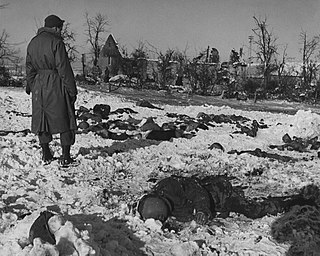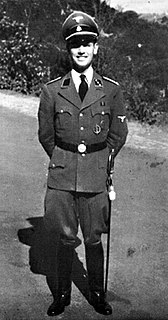See also
- Superior orders, a defense for war crimes
Criminal order or criminal orders may refer to:

The Nuremberg trials were a series of military tribunals held after World War II by the Allied forces under international law and the laws of war. The trials were most notable for the prosecution of prominent members of the political, military, judicial, and economic leadership of Nazi Germany, who planned, carried out, or otherwise participated in the Holocaust and other war crimes. The trials were held in Nuremberg, Germany, and their decisions marked a turning point between classical and contemporary international law.

A war crime is an act that constitutes a serious violation of the laws of war that gives rise to individual criminal responsibility. Examples of crimes include intentionally killing civilians or prisoners, torturing, destroying civilian property, taking hostages, performing a perfidy, raping, using child soldiers, pillaging, declaring that no quarter will be given, and seriously violating the principles of distinction, proportionality, and military necessity.

Alfred Josef Ferdinand Jodl was a German Generaloberst who served as the Chief of the Operations Staff of the Oberkommando der Wehrmacht, the German Armed Forces High Command, throughout World War II.

Wilhelm Bodewin Johann Gustav Keitel was a German field marshal and war criminal who held office as Chief of the Oberkommando der Wehrmacht (OKW), the high command of Nazi Germany's Armed Forces, during the Second World War. In that capacity, Keitel signed a number of criminal orders and directives that led to a war of unprecedented brutality and criminality.
The Nuremberg principles are a set of guidelines for determining what constitutes a war crime. The document was created by the International Law Commission of the United Nations to codify the legal principles underlying the Nuremberg Trials of Nazi party members following World War II.

The Doctors' trial was the first of 12 trials for war crimes of high-ranking German officials and industrialists that the United States authorities held in their occupation zone in Nuremberg, Germany, after the end of World War II. These trials were held before US military courts, not before the International Military Tribunal, but took place in the same rooms at the Palace of Justice. The trials are collectively known as the "Subsequent Nuremberg trials", formally the "Trials of War Criminals before the Nuremberg Military Tribunals" (NMT).

Anton Dostler was a General of the Infantry who was executed after the end of World War II for war crimes. He was shot by a United States Army firing squad after being found guilty of ordering the execution of American prisoners of war during the Italian Campaign in March 1944. Dostler was convicted in the first Allied war crimes trials to be held after the end of the war in Europe.

Erich Priebke was a German mid-level SS commander in the SS police force (SiPo) of Nazi Germany. In 1996, he was convicted of war crimes in Italy, for commanding the unit which was responsible for the Ardeatine massacre in Rome on 24 March 1944 in which 335 Italian civilians were killed in retaliation for a partisan attack that killed 33 men of the German SS Police Regiment Bozen. Priebke was one of the men held responsible for this mass execution. After the defeat of Nazi Germany, he fled to Argentina where he lived for almost 50 years.
Strafgesetzbuch, abbreviated to StGB, is the German penal code.

The High Command Trial, also known initially as Case No. 12, and later as Case No. 72, was the last of the twelve trials for war crimes the U.S. authorities held in their occupation zone of Germany in Nuremberg after the end of World War II. These twelve trials were all held before U.S. military courts, not before the International Military Tribunal, but took place in the same rooms at the Palace of Justice. The twelve U.S. trials are collectively known as the "Subsequent Nuremberg Trials" or, more formally, as the "Trials of War Criminals before the Nuremberg Military Tribunals" (NMT).

During World War II, the Germans' combined armed forces committed systematic war crimes, including massacres, mass rape, looting, the exploitation of forced labor, the murder of three million Soviet prisoners of war, and participated in the extermination of Jews. While the Nazi Party's own SS forces of Nazi Germany was the organization most responsible for the genocidal killing of the Holocaust, the regular armed forces of the Wehrmacht committed many war crimes of their own, particularly on the Eastern Front in the war against the Soviet Union. According to a study by Alex J. Kay and David Stahel, the majority of the Wehrmacht soldiers deployed to the Soviet Union participated in war crimes.

Command responsibility, sometimes referred to as the Yamashita standard or the Medina standard, and also known as superior responsibility, is the legal doctrine of hierarchical accountability for war crimes.
Imre Finta was the first person prosecuted under Canada's war crimes legislation. He was charged in 1987 and acquitted in 1990.

Sixteen European countries and Israel have laws against Holocaust denial, the denial of the systematic genocidal killing of approximately six million Jews in Europe by Nazi Germany in the 1930s and 1940s. Many countries also have broader laws that criminalize genocide denial. Among the countries that ban Holocaust denial, Austria, Germany, Hungary, Poland and Romania also ban other elements associated with Nazism, such as the display of Nazi symbols.
A war crimes trial is the trial of persons charged with criminal violation of the laws and customs of war and related principles of international law committed during armed conflict.

Superior orders, also known as the Nuremberg defense or just following orders, is a plea in a court of law that a person, whether a member of the military, law enforcement, a firefighting force, or the civilian population, should not be considered guilty of committing actions that were ordered by a superior officer or official.

Joint criminal enterprise (JCE) is a legal doctrine used during war crimes tribunals to allow the prosecution of members of a group for the actions of the group. This doctrine considers each member of an organized group individually responsible for crimes committed by group within the common plan or purpose. It arose through the application of the idea of common purpose and has been applied by the International Criminal Tribunal for the former Yugoslavia to prosecute political and military leaders for mass war crimes, including genocide, committed during the Yugoslav Wars 1991–1999.

During World War II, the Barbarossa decree was one of the Wehrmacht criminal orders given on 13 May 1941, shortly before Operation Barbarossa, the invasion of the Soviet Union. The decree was laid out by Adolf Hitler during a high-level meeting with military officials on March 30, 1941, where he declared that war against Soviet Russia would be a war of extermination, in which both the political and intellectual elites of Russia would be eradicated by German forces, in order to ensure a long-lasting German victory. Hitler underlined that executions would not be a matter for military courts, but for the organised action of the military. The decree, issued by Field Marshal Keitel a few weeks before Operation Barbarossa, exempted punishable offenses committed by enemy civilians from the jurisdiction of military justice. Suspects were to be brought before an officer who would decide if they were to be shot. Prosecution of offenses against civilians by members of the Wehrmacht was decreed to be "not required" unless necessary for the maintenance of discipline.

Incitement to genocide is a crime under international law which prohibits inciting (encouraging) the commission of genocide. An extreme form of hate speech, incitement to genocide is considered an inchoate offense and is theoretically subject to prosecution even if genocide does not occur, although charges have never been brought in an international court without mass violence having occurred. "Direct and public incitement to commit genocide" was forbidden by the Genocide Convention in 1948. Incitement to genocide is often cloaked in metaphor and euphemism and may take many forms beyond direct advocacy, including dehumanization and "accusation in a mirror". Historically, incitement to genocide has played a significant role in the commission of genocide, including the Armenian genocide, the Holocaust and the Rwandan genocide.
The Nazis and Nazi Collaborators (Punishment) Law is a 1950 Israeli law passed by the First Knesset that provides a legal framework for the prosecution of crimes against Jews and other persecuted people committed in Nazi Germany, German-occupied Europe, or territory under the control of another Axis power between 1933 and 1945. The law's primary target was Jewish Holocaust survivors alleged to have collaborated with the Nazis, in particular prisoner functionaries ("kapos") and the Jewish Ghetto Police. It was motivated by the anger of survivors against perceived collaborators and a desire to "purify" the community.